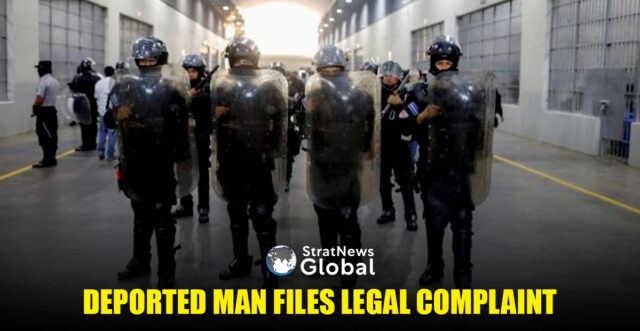A Venezuelan national submitted an official complaint on Thursday against the U.S. government for deporting him to El Salvador’s most infamous prison, launching a legal approach that could be mirrored by others who claim they were wrongly labeled as gang members by President Donald Trump’s administration.
Neiyerver Adrián Leon Rengel, 27, filed what it called an administrative complaint with the U.S. Department of Homeland Security, contending that federal employees wrongfully removed him from the United States without cause or due process.
Rengel’s complaint, which seeks $1.3 million in monetary damages, is not a lawsuit brought in a court but rather an action filed with the government alleging a violation of law. It is the first of its kind brought by one of the 252 Venezuelan men who were deported by the Trump administration to El Salvador in March.
He invoked the Federal Tort Claims Act, a U.S. law that allows people to sue the U.S. government for wrongful acts committed by federal employees acting within the scope of their employment. Under that law, a complaint must be filed with the appropriate agency before a lawsuit can be brought.
The government now has six months to investigate and respond to Rengel’s complaint. If it denies his claim or fails to respond in that time period, Rengel could then sue in federal court.
Deportation Of Alleged Gang Members
The Republican president, who campaigned in last year’s election on a pledge of mass deportations, in March invoked a 1798 statute called the Alien Enemies Act as part of an effort to quickly deport alleged Venezuelan gang members to El Salvador.
The law authorizes the president to deport, detain or place restrictions on individuals whose primary allegiance is to a foreign power and who might pose a national security risk in wartime. The U.S. government last invoked the Alien Enemies Act, which historically has been employed only during wartime, during World War Two to intern and deport people of Japanese, German and Italian descent.
The Venezuelan deportees were held incommunicado in El Salvador’s maximum security CECOT prison until they were returned to Venezuela last week as part of a prisoner swap between the United States and Venezuela.
‘Wrongly Accused’
Family and friends of some of them said the deportees were not gang members and were wrongly accused based on tattoos, hand gestures and clothing. Venezuelan government officials and deportees have said they were tortured in prison.
Rengel’s lawyers said in the complaint that, because of his tattoos, DHS employees detained him in the parking lot of his apartment in Irving, Texas, and falsely accused him of membership in the Venezuelan Tren de Aragua gang.
Department of Homeland Security spokesperson Tricia McLaughlin in a statement on Thursday reiterated the U.S. government’s claim that Rengel was associated with Tren de Aragua and said he was “deemed a public safety threat.” McLaughlin said Trump and Homeland Security Secretary Kristi Noem “will not allow foreign terrorist enemies to operate in our country and endanger Americans.”
Rengel alleged that, after moving him to a detention center, DHS employees lied to him, telling him he was being sent to Venezuela.
“Instead, for more than four months, Rengel languished in El Salvador – which is not his country of origin and a place where he has no ties – where he suffered physical, verbal and psychological abuse,” the complaint said.
(With inputs from Reuters)





